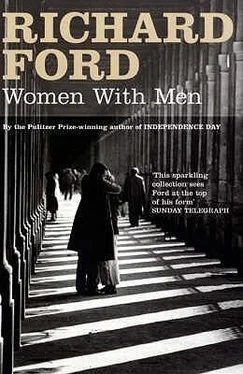Richard Ford - Women with Men
Здесь есть возможность читать онлайн «Richard Ford - Women with Men» весь текст электронной книги совершенно бесплатно (целиком полную версию без сокращений). В некоторых случаях можно слушать аудио, скачать через торрент в формате fb2 и присутствует краткое содержание. Год выпуска: 2006, Издательство: Bloomsbury Publishing PLC, Жанр: Современная проза, на английском языке. Описание произведения, (предисловие) а так же отзывы посетителей доступны на портале библиотеки ЛибКат.
- Название:Women with Men
- Автор:
- Издательство:Bloomsbury Publishing PLC
- Жанр:
- Год:2006
- ISBN:нет данных
- Рейтинг книги:3 / 5. Голосов: 1
-
Избранное:Добавить в избранное
- Отзывы:
-
Ваша оценка:
- 60
- 1
- 2
- 3
- 4
- 5
Women with Men: краткое содержание, описание и аннотация
Предлагаем к чтению аннотацию, описание, краткое содержание или предисловие (зависит от того, что написал сам автор книги «Women with Men»). Если вы не нашли необходимую информацию о книге — напишите в комментариях, мы постараемся отыскать её.
Women with Men — читать онлайн бесплатно полную книгу (весь текст) целиком
Ниже представлен текст книги, разбитый по страницам. Система сохранения места последней прочитанной страницы, позволяет с удобством читать онлайн бесплатно книгу «Women with Men», без необходимости каждый раз заново искать на чём Вы остановились. Поставьте закладку, и сможете в любой момент перейти на страницу, на которой закончили чтение.
Интервал:
Закладка:
The sales clerk stayed perched, legs crossed, on a high-tech-looking metal stool, reading Elle and wearing a preposterously short red leather skirt. And when he'd gone uncomfortably past her station by the cash register for the third time, he simply stopped and looked at her, smiled pitiably, shook his head and for some reason made a circular motion with his upraised index finger, by which he meant to indicate there were more things to admire and buy here than he could choose from, so that he was going to depart and possibly come back later. The young woman, however, looked up, smiled at him, closed her magazine and said in a shockingly American midwestern voice, “If there's anything I can help you with, just ask. I'm not very busy, as you can see.”
At the end of ten minutes, Matthews had made his wishes, qualms and time restrictions known to the young woman, who was Canadian and who knew all about shipping, wrapping, customs declarations and valuation limits on packages sent to America. She even found, by looking in a book, the exact category of gift recommended for six-year-old French girls, from which Matthews chose a bright-yellow wall tablet made of plastic that allowed for the leaving of written messages, and from which messages could both be erased and electronically retrieved by pushing a red button on the side. He wasn't positive Lelia would like this, since she was reportedly better at math than at writing; but she could do math on it if she wanted to, and it wasn't American and had French phrases —Hallo? On y va? Ça va bien? N'est-ce pas? — worked into the yellow plastic border, along with molded images of the Eiffel Tower, the Arc de Triomphe, the Bastille, the Panthéon, a bridge of some kind: everything but Napoleon's tomb.
This, the clerk promised, would be carefully wrapped, insured against breakage and delivered by courier to Penny's house in Palomar Park on or before Christmas Eve. The entire cost was less than a thousand francs, which Matthews put on his credit card. He also inserted inside the box a handwritten note. Dear Sweetheart, You and I will spend next Christmas together in Paris, n'est-ce pas? On y va. Voilà. Dad.
As a result of his successful transaction, when he walked back out into rue Bréa, where the slant, late-morning sunlight on cobblestone pavement felt even warmer than earlier, as if December might just as easily give way straight to spring, he sensed the whole day had been saved, and he was even more free than ever to do exactly as he pleased. Paris wasn't menacing; he'd been right yesterday. And he could operate in it more or less on his own, just as he thought he'd be able to, even though it annoyed him not to know enough words to ask directions, or to understand if any were offered. He would need to stick to the simple, familiar touristic objectives (buying a newspaper, ordering coffee, reading a taxi meter), though this impasse would improve soon enough. But language or no language, he could go wherever he chose — even if he could only order coffee when he got there. The best idea was to treat Paris like a place he knew and felt comfortable, no matter how resistant and exotic it might turn out to be. He decided he'd buy flowers for Helen and let that be his first completely French transaction. A flower stall would come along the same way the toy shop had.
At the bottom of rue Bréa, he turned left toward what the Fodor's indicated would be the Luxembourg Gardens, hoping to take a walk on the sunny lawns, watch children maneuver their small boats in the lagoon (Helen had talked about this) and eventually cross to the Panthéon and angle down to the Sorbonne, while gradually making his way, if he could find it, to the St.-Sulpice church and rue du Vieux-Colombier, where the famous Club 21 had once been located, and where Sidney Bechet and Hot Lips Page played in the fifties. Why not go there, he decided, after all the hours logged yakking about places and people he never knew? He had no idea why the place stayed in his mind or what he hoped to see. Probably it would just be a boarded-up hole-in-the-wall — something else that existed only in a book. Though not his book. He'd made no references to any black clubs in The Predicament. They had nothing to do with his female character's — Greta's — ill-fated stay. Plus he knew nothing about jazz and didn't much care.
Sending a present off to Lelia had put Penny back in his mind — an unwelcome visitor. He realized that after Penny left, no matter how he felt at the time, or how many novels her leaving might've ignited, or how deep the trenches of despondence that might've cut down through his life, his assumption had always been that at some point he would simply “switch off.” Switch off from Penny and on to something or somebody else. That's what he assumed people did if life was to go on. Airline-crash survivors, emigrants, exiles of war — they all drew for themselves, or had drawn for them, a line of demarcation they crossed once but then never stepped back over again.
Now, though, clearheaded for the first time in days, he realized that this assumption about lines of demarcation might not be entirely realistic; that succeeding as an exile was possibly a slower, more lingering process and could be one that never got completed before you died (children made it much more difficult). And though sometimes he nonchalantly thought it didn't matter if he and Penny got divorced or never did, or if he sometimes felt as if Penny had gone down in a jetliner and would never be heard from, neither of those was true, so that stronger measures needed to be taken to bring about the desired result. Divorce, in other words. He'd been reluctant or casual or inattentive about it up to now. But no more. Divorce would be his first official act upon arriving back in Ohio. If Penny thought she wanted a divorce from him, she couldn't conceive of the divorce he'd set in motion starting day one. He and Penny would be “switched off” by February, and that was a promise.
This had to do, he understood, with wanting not to be the center of things, with wanting to get lost in events, with conceivably even fitting into the normalcy of another country — though normalcy, of course, was foolish to think about. Look around (he said this unexpectedly out loud). He could never fit in in Paris. Except that was no reason you couldn't, with the right set of motivations, be here, even live here, find an apartment, learn the streets and enough of the language to follow directions. If you couldn't totally switch off, or switch on, you could make clear and decisive moves to produce at least some desired results. You could have part of what you wanted.
He reached what he thought on the map should be rue d'assas, with the Luxembourg directly across the street. But instead he found a different street, rue Notre-Dame-des-Champs, and ahead of him was not the great garden with the seventeenth-century palace built by the Medicis, but once again the Boulevard Raspail, a part of it he hadn't been on. Though the Luxembourg Gardens still had to be on his right. He should simply take the first street that way, even though that meant going back out onto Raspail, clogged now with spewing, honking traffic, stalled in both directions. It was smart, he felt, to be on foot.
The first street off the congested boulevard turned out to be rue Huysmans, which began in the right way until it split into two separate streets, with the one Matthews hoped to take to the Luxembourg blocked to pedestrian traffic by some kind of police action. Several white police vehicles with blue flashers, and even more white police motorcycles, with their helmeted riders sporting machine guns and black flak vests, were congregated around a small bareheaded man seated in the middle of the paved street, his hands raised behind his neck. A few French passersby stood watching down the short street, though a young policeman, also wearing a black flak jacket and black helmet, was using his machine gun to motion pedestrians onto the narrow street Matthews hadn't wanted to go on, rue Duguay-Trouin. Staring down at the man seated in the street, he wondered if there could be a connection between this event and the popping sounds — gun noises — he'd heard last night. Probably there was.
Читать дальшеИнтервал:
Закладка:
Похожие книги на «Women with Men»
Представляем Вашему вниманию похожие книги на «Women with Men» списком для выбора. Мы отобрали схожую по названию и смыслу литературу в надежде предоставить читателям больше вариантов отыскать новые, интересные, ещё непрочитанные произведения.
Обсуждение, отзывы о книге «Women with Men» и просто собственные мнения читателей. Оставьте ваши комментарии, напишите, что Вы думаете о произведении, его смысле или главных героях. Укажите что конкретно понравилось, а что нет, и почему Вы так считаете.












